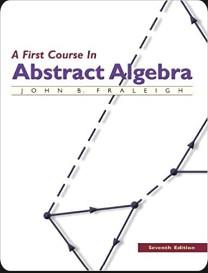Give an example of an f(x) Q[x] that has no zeros in Q but whose zeros
Question:
Give an example of an f(x) ∈ Q[x] that has no zeros in Q but whose zeros in C are all of multiplicity 2.
Explain how this is consistent with Theorem 51.13, which shows that Q is perfect.
Data from Theorem 51.13
Every field of characteristic zero is perfect.
Proof Let E be a finite extension of a field F of characteristic zero, and let α ∈ E. Then f(x) = irr(α, F) factors in F[x] into 
where the αi are the distinct zeros of irr(α, F), and, say, α= α1. Thus

and since v · 1 ≠ 0 for a field F of characteristic 0, we must have

by Lemma 51.11. Since f(x) is irreducible and of minimal degree in F[x] having α as a zero, we then see that v = 1. Therefore, α is separable over F for all α ∈ E. By Corollary 51.10, this means that E is a separable extension of F.
Step by Step Answer:






